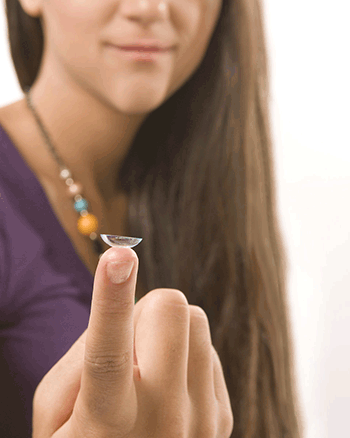When it comes to correcting vision, both contact lenses and glasses offer effective solutions, but they come with distinct advantages and disadvantages. Choosing between them can depend on various factors, including your lifestyle, comfort preferences, and eye health. Here’s a comprehensive look at the differences between contacts and glasses to help you make an informed decision.

1. Comfort and Convenience
- Glasses:
- Pros: Glasses are easy to put on and take off. They don’t require direct contact with your eyes, making them a hassle-free option for many people.
- Cons: Some wearers may find glasses uncomfortable, especially if they slide down the nose or feel heavy on the face. They can also fog up in humid conditions or when transitioning between temperatures (e.g., from the cold outside to a warm indoors).
- Contacts:
- Pros: Contacts provide a full field of vision without any obstructions. They don't fog up or get in the way during activities like sports or exercising, and they often feel more natural once worn properly.
- Cons: Contacts require a bit of practice to insert and remove. Some people may find them uncomfortable, especially if they have dry eyes or sensitivities.
2. Vision Correction
- Glasses:
- Pros: Glasses can easily correct various vision problems, including myopia (nearsightedness), hyperopia (farsightedness), astigmatism, and presbyopia. They also provide a layer of protection against debris and dust.
- Cons: Glasses can sometimes distort peripheral vision, especially if the frames are thick or the lenses are of a higher prescription.
- Contacts:
- Pros: Contacts conform to the curvature of your eyes, providing a wider field of vision without distortion. They can also offer better vision correction for astigmatism with toric lenses.
- Cons: Some types of contacts, particularly rigid gas permeable lenses, may take longer to adjust to compared to glasses.
3. Aesthetic Considerations
- Glasses:
- Pros: Glasses can be a fashion statement and come in various styles, colors, and materials. They can enhance your look and allow you to express your personal style.
- Cons: Some people may feel that glasses do not suit their face shape or may not like how they look in them.
- Contacts:
- Pros: Contacts offer a more natural appearance since they are nearly invisible. They also allow for the freedom to wear makeup without worrying about it smudging on glasses.
- Cons: If you like to change your look frequently, colored contacts might be an option, but they may require additional care.
4. Maintenance and Care
- Glasses:
- Pros: Glasses require minimal maintenance. A quick clean with a microfiber cloth is usually sufficient, and they can last for years with proper care.
- Cons: They can get scratched, and you may need to replace them if your prescription changes significantly.
- Contacts:
- Pros: Daily wear contacts can be convenient as you simply dispose of them after use. Many brands offer extended wear options that allow you to wear them overnight.
- Cons: Contacts require diligent cleaning and maintenance to avoid infections. You need to follow a specific routine to ensure they remain safe to wear.
5. Cost Considerations
- Glasses:
- Pros: While the initial cost of glasses can be higher, they often last longer than contacts. Once purchased, there are no recurring costs except for cleaning supplies.
- Cons: Depending on the type of frames and lenses, glasses can become expensive, especially if you require specialized lenses.
- Contacts:
- Pros: The initial cost for a contact fitting may be lower than purchasing glasses.
- Cons: Contacts have ongoing costs, including replacement lenses and cleaning solutions, which can add up over time.
6. Eye Health Considerations
- Glasses:
- Pros: Glasses can help reduce eye strain and protect your eyes from harmful UV rays (if UV-protected lenses are used). They also provide a barrier against environmental irritants.
- Cons: Glasses do not provide as much protection against wind or debris as contacts might.
- Contacts:
- Pros: Contacts can provide more natural vision and are less likely to slide down your nose during activities.
- Cons: There is a higher risk of eye infections if contacts are not properly cleaned and cared for.
Conclusion
Choosing between contact lenses and glasses ultimately depends on your personal preferences and lifestyle. Consider factors such as comfort, convenience, aesthetics, maintenance, and cost when making your decision. Many people choose to use both—glasses for everyday wear and contacts for special occasions or activities. Consulting with your eye care professional can help you determine which option is best for your vision needs and lifestyle. Remember, the most important thing is to ensure that you have clear and comfortable vision!
Make your appointment today
To make your appointment, simply give us a call (760)-948-3345 or
or
At Golden Eye Optometry, we view good vision care as front line protection at every age. A routine eye exam can detect more than poor vision. It can shed early light on glaucoma, macular degeneration, cataracts and diabetes.
Information received through Golden Eye Optometry social media channels is for informational purposes only and does not constitute medical advice, medical recommendations, diagnosis, or treatment. Always seek the advice of your eye doctor, physician, or other qualified health provider with any questions you may have regarding a medical condition.